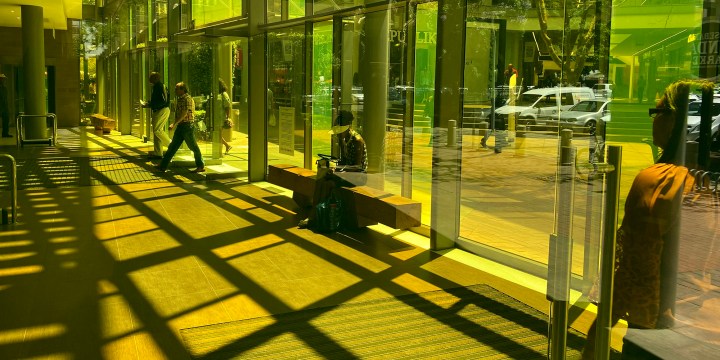BUSINESS MAVERICK
South Africa’s shopping mall malaise worsens – and the road to recovery will be long

The financial results of Hyprop Investments and Growthpoint Properties indicate that foot count and retail spending at malls are still in the doldrums and far from reaching pre-Covid-19 levels. But they are slowly recovering.
The financial results of two JSE-listed shopping mall owners underscore that the road to recovery for SA’s retail sector and consumer spending – from a series of black swan events – is turning out to be slow and bumpy.
Shopping malls have been hit by stop-start lockdown restrictions over the past 19 months, negatively affecting their tenants such as restaurants, travel agencies, hair and beauty salons. The week of anarchy and riots in Gauteng and KZN during July made SA’s shopping mall malaise even worse.
The financial results of Hyprop Investments and Growthpoint Properties, both published on Wednesday, indicate that foot count and retail spending at malls are still in the doldrums and far from reaching pre-Covid-19 levels. But they are slowly recovering.
At Hyprop, the owner of Rosebank Mall and Hyde Park Corner in Gauteng, Canal Walk and Capegate in the Western Cape, and others, the average monthly foot count at its malls fell by 7.6% from early 2020 to the end of June 2021. Over the same period, trading densities – a metric for retail spending at malls as it measures sales per square metre – fell by 2.5%.
One fact is abundantly clear: shopping malls tend to perform better when the level of lockdown is eased by the government. Housebound consumers normally want to go out and participate in retail therapy when lockdown regulations allow them to do so.
For example, Hyprop reported the highest foot count and trading densities at its malls during April and May 2021, months in which SA operated under eased lockdown regulations (see table below). Foot count grew by 172.8% and 40% in April and May 2021, respectively, compared with the same periods in 2020. Hyprop’s trading densities reached their highest level in May of R3,000.
Growthpoint Properties, the owner of Brooklyn Mall in Gauteng, N1 City Mall in the Western Cape, Greenacres Shopping Centre in Gqeberha, and others, is also seeing pressures in its foot count and trading densities. By May 2021, foot count at Growthpoint’s malls had increased by 72% compared to the same period in 2020. But the foot count tumbled after SA moved to a strict Level 4 lockdown as the third wave of Covid-19 infections took hold.
Growthpoint’s trading densities are slowly recovering, as they fell by 0.7% in 2020 but grew by 1.9% for the 12 months to June 2021. The recovery was driven by retail categories that are not affected by lockdown regulations in their trading activity, such as supermarkets, clothing, homeware, and electronics retailers.
Relief measures to tenants
The financial results of Growthpoint and Hyprop also show that their tenants are facing financial pressures and still require relief measures such as rental payment deferments and discounts. During its 2021 financial year, Hyprop granted discounts to its tenants amounting to R159-million across its entire property portfolio, which includes office properties.
Growthpoint also had to throw a financial lifeline to its struggling tenants, mainly restaurants, taverns and jewellers.
It was forced to stomach arrears in rental payments. Arrears reached R145.8-million during Growthpoint’s 2021 financial year, with outstanding rental payments from cinema chain Ster-Kinekor (owing R23.3-million) and stationery and books retailer CNA (owing R9.4-million). Both companies are in business rescue because they are financially distressed.
The big question is, how will shopping malls – especially large and dominant ones – survive in a Covid-19 world when consumer shopping habits have fundamentally changed?
Keillen Ndlovu, head of listed property funds at Stanlib, believes that bigger malls will still feel more pain.
“Some of them [bigger malls] are oversized for the new environment we are now in. Online shopping is growing but will not grow to the same levels as the developed world like the US, UK and Europe,” Ndlovu said. Online sales are still less than 2% of total sales in SA.
The lockdown has favoured small neighbourhood and community malls, which give consumers a quick in-and-out shopping experience instead of them negotiating a parking bay maze and dozens of stores before getting to where they want to be.
Hyprop CEO Morné Wilken doesn’t believe that shopping malls are dead, but that landlords will be forced to make them more compelling and attractive to consumers.
The repositioning of Hyprop’s shopping experience at its traditional malls is important to make them attractive, said Wilken. Hyprop wants to embrace an omnichannel offering at its malls by introducing options such as click-and-collect for consumers who bought goods online. DM/BM
"Information pertaining to Covid-19, vaccines, how to control the spread of the virus and potential treatments is ever-changing. Under the South African Disaster Management Act Regulation 11(5)(c) it is prohibited to publish information through any medium with the intention to deceive people on government measures to address COVID-19. We are therefore disabling the comment section on this article in order to protect both the commenting member and ourselves from potential liability. Should you have additional information that you think we should know, please email [email protected]"

















